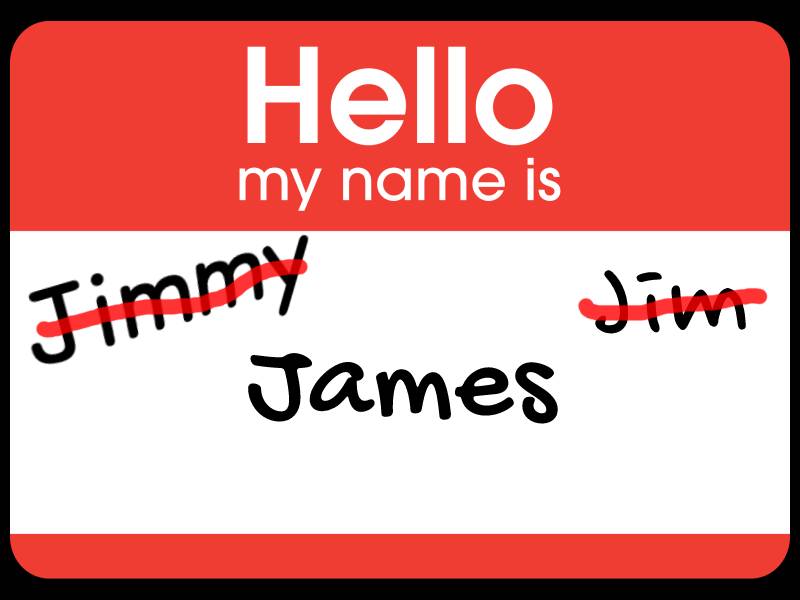First, I was Jimmy; then Jim; finally, James. I remember the moment during my first day of kindergarten when the teacher asked me what I would like to be called, and I said “Jimmy” because that’s what my family called me. When I began high school, the shorter form of the diminutive sounded more mature, so I became Jim. Finally, entering college, puffed up by my new collegiate status and aware of another opportunity to reinvent myself, I arrived at James. It was the name on the birth certificate, I said; the real reason was that there were other, cooler guys with that name, particularly one Mr. Bond, James Bond. But my family still called me Jimmy.
What if I hadn’t changed from Jimmy or Jim? What if I had gone by my middle name? (“Hey, Art!”) What if my parents had named me something else? Name and identity are interwoven. It is why parents spend much time pondering their progeny’s possible names, and why we, the progeny, tweak (or sometime change) them to suit our self-perception. Or we don’t when we possibly should have. A local radio station once had a traffic reporter named Robin Banks, who said (naturally), “I’m Robin Banks.” Stop that woman—she’s robbin’ banks! And then there was another radio personality, Stew Berger … as opposed to grilled or fried, I suppose. Their parents either didn’t grasp or didn’t care what they were inflicting upon their children, who obviously went with it anyway (especially Stew, who could have insisted upon Stewart). But those American parents, having no connection to Wales other than an over-fondness for Lord of the Rings movies, who saddled their kids with indigestible Welsh names like Fflamddwyn, knew exactly what they were doing.
So, choosing a proper name is important, and not just for people. Naming a company is the first step in branding it; adapting that name for a website requires considering the consequences of choosing poorly. Case in point: Experts Exchange, “The Original Technology Community.” Until recently you could go to their website and see a “statement of purpose” (“Formed in 1996, Experts Exchange (EE) is one of the oldest online communities in the world. For 25 years, tech problem-solvers worldwide have gathered on EE to share knowledge and help each other succeed.”), on which was a button inviting you to “Join the Community”; below that was a link having the text, “Click here to enter the time machine >>” (the opening “Click here” and closing right angle brackets were a nice retro touch—giving them the benefit of the doubt and assuming that “retro” was their intent).
This has been replaced by an About Us page, having a “Visit the throwback page” button, taking you to to the Experts Exchange home page circa 1996. You will see a world before CSS, before web fonts, before quality graphics, before design, when the web was still the domain of tech geeks, not art majors, and dinosaurs ruled the Earth (at least in Steven Spielberg movies). What you will not see is how their domain name was spelled out then. Now it reads “experts-exchange.com”; ‘twas not always so. That hyphen is important, acting as punctuation, and punctuation can have momentous consequences. Absent a comma, “Let’s eat, grandma” becomes “Let’s eat grandma”; absent that hyphen, “experts [-] exchange” becomes … something else. Literally, “expertsexchange,” which some read as:
Expert. Sex. Change.
Not what they wanted, but tech geeks, being a very literally minded folk, did not see it right there in front of them. Neither did the folks at Kid’s Exchange [you see where this is going] Consignment Sale of Wake Forest, North Carolina, who, realizing that what is seen cannot be unseen, and that no hyphen would be sufficient, chose to have their original domain name, kidsexchange.net (Puberty Blockers ”R” Us?), redirect to kxconsignment.com, their current (and marginally better) domain name. Rule Not to Be Broken: If the first word of your business/domain name is plural or possessive or just ends in s, do not, whatever you do, follow it with “exchange” (or “express”—see wintersexpress.com of Winters, California); no good can come of it. Other domains badly in need of a hyphen (at least):
- whorepresents.com: Who Represents, not “whore presents”;
- penisland.net: Pen Island, not … nope, not spelling it out for you;
- masterbaitandtackle.com: Master Bait and Tackle, “calling Bonita Beach [Florida] home since 1994,” which, like those Lord of the Rings parents, knew very well what they were doing with that name, and who must make far more on their merch than they do on bait or tackle; I’d be willing to bet real cash money on this.
And there’s more, you gluttons for punishment.
(An oral-aural analog: I once knew of a chorus that sang a piece containing the phrase, “I cease not”; try as they might, this kept coming out as “I see snot.”)
Sometimes it’s not your name but how people encounter it. I recently searched Google for a particular car and at the top of the results page was a sponsored result, a Forbes article pointed to with this link: “32 Unreliable Cars – Forbes – 32 Cars To Avoid At All Cost” (which should have read either “at all costs” or “at any cost,” if you will excuse the pedantry). The car I searched for was not on the list yet nonetheless was tarred by the brush of a transitory ad which disappeared when I did the search again later. Nothing you can do about this one, though. As Mark Knopfler put it in his song: sometimes you’re the windshield, sometimes you’re The Bug.
And sometimes the wound is self-inflicted. Needing a new coffee grinder, I searched Google for one favorably mentioned in a comparison article I had read. Imagine my dismay (momentary, as we shall see) when I came upon a link reading “KRUPS Ultra-Quiet One-Touch Coffee Grinder – Don’t Waste Your Money.” Don’t waste my money? Must not be any good. But I followed the link, read the article, and saw they liked it, saying, “you’ll love this grinder.” So, what gives? The problem is, this consumer review site named itself “Don’t Wa$te Your Money” (the dollar sign is in the logo, just like the artist formerly known as Ke$ha). Cute, but when your site name shows up in search results, as often happens, it could scare people away from a product you recommend if “Don’t Waste Your Money” is cheek-by-jowl with it.
Forethought is far preferable to any amount of mitigation after a mistake, which may need to take the form of redirects, SEO, or apologies to your offspring. But if you name your youngster Fflamddwyn and your ancestry is neither Welsh nor Elvish, there waits for you a special place in hell.
Or Mordor.

